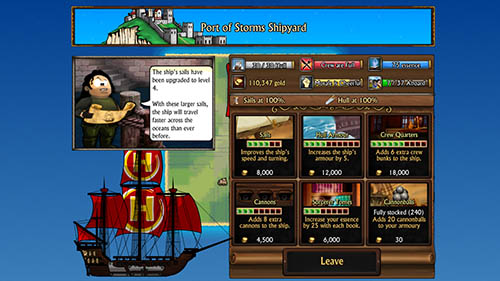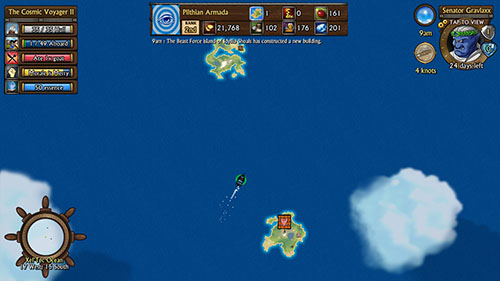I’m Oliver Joyce, founder of the indie game label Whiskeybarrel Studios, and best known as the developer of the gladiator RPG series Swords and Sandals. I’ve done a few posts here at IndieGameBuzz in the past just talking about the series, and today I want to talk a little about my latest launched game, reflect on the development journey behind it, and indeed my game development path so far. It’ll be a little meandering, but stick with me.
The chaotic arena of indie game development
Indie game development is, more than ever, a crapshoot. Nothing is guaranteed, nothing at all. Developers can toil away for years on a game only to have it launched and sink without a trace. Others can slap something together in a week and see it rocket to the top of the charts. Think of Flappy Bird, for instance.
You’re basically building your own ticket to enter into a lottery with the odds stacked heavily against you.
Perhaps a more apt analogy, particularly as my games are themed as such, is comparing the game market to an arena.
Every day, hundreds of games are thrown into the app stores like gladiators into battle. Most will die in obscurity, a few will live, even thrive, growing fat off the profits and adulation of the crowd. And then you have those gladiators who win a few battles and some respect, survive the day but do not catch the limelight of the adoring public.
Swords and Sandals is one such series. I’ve been making these games for 12 years now. The early Flash versions had ridiculous success, the first three being played millions of times across the various game portals like Newgrounds and Kongregate – so much so it developed a bit of a cult following over the years.
After the bubble
The Flash bubble eventually burst, and when the market shifted to mobile gaming and downloadable, I had to adjust accordingly. In recent years, I’ve remade the first few games in the series and done a few spinoffs, to mixed success. I’ve made enough money to be able to work on these games a few days a week, but not enough to go full-time. Much of the development is done late at night and on weekends, and progress is often slow. Such is the indie reality for most devs.
Swords and Sandals Pirates is the latest in the series, and was released on December 1st. It’s a pirate themed RPG where you choose one of ten captains and compete for dominance over an ocean of islands. Battle at land and at sea, conquer and build on islands, search for sea monsters, all the usual pirate-y goodness in a casual but strategic game. I was trying to build a game that felt a little like Civilization, a little like Sid Meier’s Pirates and, of course, a lot like the Swords and Sandals games of old. Whether I’ve succeeded or not, it’s hard to say – only the public can judge that.
Reviews have generally been positive, but there hasn’t been a great deal of fanfare. The mainstream press will never cover games such as mine for whatever reason, but thankfully Youtubers making Lets Play videos of the game help to breath life into it. These videos have been the lifeblood of the series over the last few years, without them my game dev journey would have been over, dead on the arena sands.
Role playing games such as Swords and Sandals Pirates are not easy things to build – they’re in fact amongst the hardest games you can attempt to put together. So many systems must be juggled and balanced, worlds and stories must be crafted – it is not for the faint of heart. And yet, they are lately amongst the more common games seen on Steam – because in general RPGs are inherently pretty captivating, when done well.
The long voyage through the night
S&S Pirates took me 4 years to make, though perhaps that is misleading. Having lost the rights to my Swords and Sandals intellectional property when I left my old company, I was at a bit of a loss, creating a few smaller games before eventually embarking on the idea of building a large seafaring adventure based on the journeys of famous explorers such as Cortez and Vasco DaGama.
I started the game four years ago in December 2014. It was a strange time in my life – after working nearly a decade with the same company, I found myself adrift once more. Freelancing a little, the rest of the time I spent prototyping small games and hoping they’d be a success.
The latest, with a working title of Ships and Scurvy, was started with only a little research and not much in the way of a design document – which would prove a big mistake. About six months into development I had a working prototype. Sharing it round with friends and colleagues, I came to the awful realisation that the game wasn’t as much fun to play as it had had been conceptually.
I’d gone kind of crazy on certain aspects of the game such as resource gathering ( to the point where every item in the game had properties such as nutrition value, expiration date, mineral type and so on!), and the game was bogged down in detail and complexity. Players found it tedious and confusing – there was just no magic connection between the game and the players.
Discouraged but not completely defeated, I put the game aside to let it rest a while. The timing coincided with a new job, and the reclamation of the rights to the Swords and Sandals name with a new publisher, egames.com. I started full-time work again, and in addition signed a contract with eGames to rebuild a few of the old Swords and Sandals games as a redux series. Two years passed and I released the games on Steam, iOS, Android, and they sold pretty well. As mentioned earlier, these games represent the gladiators who survived the arena long enough to make me enough money to go part time again about a year ago.
Wrapping up Swords and Sandals V: Grail of Antares in January this year, I took a little time off then returned to try and finish off the game I’d abandoned in Ships and Scurvy. I rebranded it as a Sandals game and reworked the game to fit into the S&S universe and timeline, adding in familiar characters and places from the series.
I also completely reworked the game to make it more of a self-contained strategy game, rather than a linear quest. Players were given 25 day to conquer the oceans against 9 computer pirate captains. At the end of the final day, a Pirate Council would convene to decide upon a winner. Giving the players agency to do whatever they wanted in the game ( within the confines of the game’s systems of course) allowed, in my mind, a much more replayable experience. Different tactics and strategies would allow the game to be approached again and again from different angles.
Rough sailing on a leaky boat
The game itself was, and no mistake, a massive challenge to finish off. The technology I was using (Adobe AIR and the Starling framework, basically an enhanced version of Flash) had fallen hugely out of favour and lacked many of the conveniences and bells and whistles of modern game engines such as Unity or Unreal. Nearly everything in the game had to be hand coded by me, from the particle systems to the collisions to the UI for the shops, the save systems, the menus, everything. I estimate I spent nearly 75% of the game’s development time on the menu systems alone – far too long, and in hindsight something that could have been avoided if I’d used a proven game engine like the others.
The other downside to rolling with my own game engine meant that, despite the fact that I’ve tried to polish Swords and Sandals as best I can, it’s very hard to compete with games made in modern engines. For example, I didn’t have access to realtime dynamic shadows or reflective water. No day or night cycles for my ships or sparkling ocean – I had to use little tricks like adding transparent blue quads above everything to signify night time, or scroll a texture over another blue quad to simulate waves.
The great irony of all this is, although I had to work a lot harder to get S&S Pirates built, it ended up not looking as polished as a game that might have been easier to make in Unity. Couple this with the arrival of my baby son Isaac at the end of January and it was a real struggle to get this game built – much of the work done in those wee hours of the morning, when you’re sleep deprived and the only fuel you have is the motivation to get the proverbial monkey of a 3.5 year long project off your back.
Gazing back out to sea
Hindsight is a wonderful thing, of course. At the time I’d begun work on S&S Pirates again earlier this year, I had built about 70% of the game and had a ton of assets already. In my mind, I figured it was too late to switch game engines, and in the end I battled through and am proud of what I have been able to make given the limited tech I was working with.
The harsh reality is though there are no prizes for trying hard, or for rolling your own custom engine. The end user doesn’t really care about your development struggles, and nor should they. They care that the game is fun, is bug free and is, to their minds, fair value.
I believe I have created that experience in Swords and Sandals Pirates. If you can look past the relatively simplistic graphics and lack of bells and whistles, I think there is a deep, strategic and ultimately charming game in there for fans of seafaring adventures.
Sales so far, as mentioned earlier, have been alright. They’re in the hundreds of copies sold, not the thousands – though its only in the first week and sometimes these things can have a longer tail, of course. It’s not a disaster and it’s not a rousing success. When you launch a game, you have that faint hope in the back of your mind that somehow it’s going to be this massive runaway hit, but the reality for most of us is you’re lucky if you make your development costs back. This has been a part time job, part time hobby for me – if I were to add up the hours I worked on building the game, it would have been a small fortune in billable hours.
I think though, that’s the wrong way to look at it. Game dev is a passion of mine, I made them long before I had an audience and I’ll make them when I’m an old man. If your passion is your job, you’ll work harder than you ever have , but it won’t feel like work most of the time. I honestly would rather build games than play them – to the point where I bought Red Dead Redemption 2 a month ago but it’s been sitting on my shelf gathering dust ( staggeringly amazing a game as it is.)
Know who you’re sailing with
Anyway … I’m working on the mobile port of S&S Pirates as we speak, which brings the game to a different audience altogether, the casual crowd who will see the game in a different light – you’re now competing with much simpler games instead of the juggernauts of the triple A games industry. These fans are much more instant, they will download your game on a whim and dismiss it just as quickly. The key, I think, is to diversify your potential audience as much as you can. If your game doesn’t sell on one platform, you want the option to try it out on another audience. The ballet crowd doesn’t necessarily want Fast and Furious 8, for example, just as the Fast crowd may not enjoy Swan Lake.
In a few weeks, the game development journey for Swords and Sandals Pirates will be over for me. Sure, a few patches will follow to keep the game stable and tweak things as issues come to light, but it is an incredible relief to be watching the ship sail off into the sunset.
Games are, as much as any entertainment industry, a craft of endeavour and passion; especially so when built by solo developers or small teams. Many are made for the love of it, most will not succeed commercially, but yet every day we see more and more out there.
The horizon beckons once again
I’ve been developing games for 25 years, (15 professionally) and with every game I make mistakes. The most important thing is that I make new mistakes. With each game I ship, I learn what I did wrong and try to improve for the next one. I already have some ideas for the next game in the Swords and Sandals pantheon, the first using the Unity game engine.
The thing I try to keep in my mind as I build these games is that it is not always about swinging for the fences, about building a game you think will make you an instant millionaire, but about building a library of games that brings you in more and more money each launch. With each game I build, the income increases, closer and closer to that goal of building games full time under my Whiskeybarrel Studios label.
Swords and Sandals Pirates won’t make me rich, but it, along with the previous games in the series ( and the support of a loyal and forgiving fan base) , has allowed me the privilege to keep building the games I love. As I’ve said before, I’ll keep making games as long as people keep playing them … hopefully for many more years to come.
Swords and Sandals Pirates is out now on Steam and is coming soon to iOS and Android.















No comments